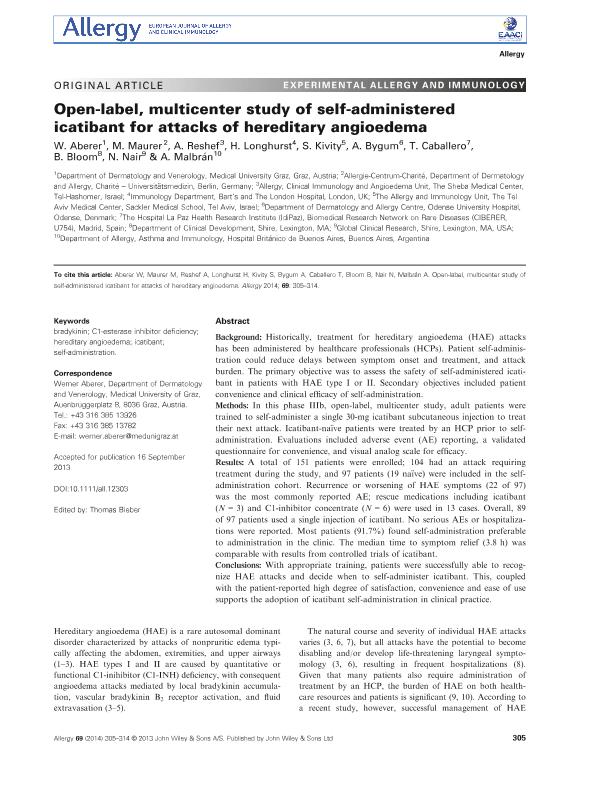Mostrar el registro sencillo del ítem
dc.contributor.author
Aberer, W.
dc.contributor.author
Maurer, M.
dc.contributor.author
Reshef, A.
dc.contributor.author
Longhurst, H.
dc.contributor.author
Kivity, S.
dc.contributor.author
Bygum, A.
dc.contributor.author
Caballero, T.
dc.contributor.author
Bloom, B.
dc.contributor.author
Nair, N.
dc.contributor.author
Malbrán, Alejandro

dc.date.available
2019-11-13T22:33:18Z
dc.date.issued
2014-03
dc.identifier.citation
Aberer, W.; Maurer, M.; Reshef, A.; Longhurst, H.; Kivity, S.; et al.; Open-label, multicenter study of self-administered icatibant for attacks of hereditary angioedema; Wiley Blackwell Publishing, Inc; Allergy; 69; 3; 3-2014; 305-314
dc.identifier.issn
1398-9995
dc.identifier.uri
http://hdl.handle.net/11336/88835
dc.description.abstract
Background: Historically, treatment for hereditary angioedema (HAE) attacks has been administered by healthcare professionals (HCPs). Patient self-administration could reduce delays between symptom onset and treatment, and attack burden. The primary objective was to assess the safety of self-administered icatibant in patients with HAE type I or II. Secondary objectives included patient convenience and clinical efficacy of self-administration. Methods: In this phase IIIb, open-label, multicenter study, adult patients were trained to self-administer a single 30-mg icatibant subcutaneous injection to treat their next attack. Icatibant-naïve patients were treated by an HCP prior to self-administration. Evaluations included adverse event (AE) reporting, a validated questionnaire for convenience, and visual analog scale for efficacy. Results: A total of 151 patients were enrolled; 104 had an attack requiring treatment during the study, and 97 patients (19 naïve) were included in the self-administration cohort. Recurrence or worsening of HAE symptoms (22 of 97) was the most commonly reported AE; rescue medications including icatibant (N = 3) and C1-inhibitor concentrate (N = 6) were used in 13 cases. Overall, 89 of 97 patients used a single injection of icatibant. No serious AEs or hospitalizations were reported. Most patients (91.7%) found self-administration preferable to administration in the clinic. The median time to symptom relief (3.8 h) was comparable with results from controlled trials of icatibant. Conclusions: With appropriate training, patients were successfully able to recognize HAE attacks and decide when to self-administer icatibant. This, coupled with the patient-reported high degree of satisfaction, convenience and ease of use supports the adoption of icatibant self-administration in clinical practice.
dc.format
application/pdf
dc.language.iso
eng
dc.publisher
Wiley Blackwell Publishing, Inc

dc.rights
info:eu-repo/semantics/openAccess
dc.rights.uri
https://creativecommons.org/licenses/by-nc-sa/2.5/ar/
dc.subject
BRADYKININ
dc.subject
C1-ESTERASE INHIBITOR DEFICIENCY
dc.subject
HEREDITARY ANGIOEDEMA
dc.subject
ICATIBANT
dc.subject
SELF-ADMINISTRATION
dc.subject.classification
Alergias

dc.subject.classification
Medicina Clínica

dc.subject.classification
CIENCIAS MÉDICAS Y DE LA SALUD

dc.title
Open-label, multicenter study of self-administered icatibant for attacks of hereditary angioedema
dc.type
info:eu-repo/semantics/article
dc.type
info:ar-repo/semantics/artículo
dc.type
info:eu-repo/semantics/publishedVersion
dc.date.updated
2019-10-28T14:35:04Z
dc.identifier.eissn
0105-4538
dc.journal.volume
69
dc.journal.number
3
dc.journal.pagination
305-314
dc.journal.pais
Reino Unido

dc.journal.ciudad
Londres
dc.description.fil
Fil: Aberer, W.. Medical University Graz; Austria
dc.description.fil
Fil: Maurer, M.. Charite – Universitatsmedizin; Alemania
dc.description.fil
Fil: Reshef, A.. The Sheba Medical Center; Israel
dc.description.fil
Fil: Longhurst, H.. Bart’s and The London Hospital; Reino Unido
dc.description.fil
Fil: Kivity, S.. The Tel Aviv Medical Center; Israel
dc.description.fil
Fil: Bygum, A.. Odense University Hospital; Dinamarca
dc.description.fil
Fil: Caballero, T.. Biomedical Research Network on Rare Diseases; España
dc.description.fil
Fil: Bloom, B.. Global Clinical Research; Estados Unidos
dc.description.fil
Fil: Nair, N.. Global Clinical Research; Estados Unidos
dc.description.fil
Fil: Malbrán, Alejandro. Consejo Nacional de Investigaciones Científicas y Técnicas; Argentina. Hospital Británico de Buenos Aires; Argentina
dc.journal.title
Allergy

dc.relation.alternativeid
info:eu-repo/semantics/altIdentifier/doi/http://dx.doi.org/10.1111/all.12303
dc.relation.alternativeid
info:eu-repo/semantics/altIdentifier/url/https://onlinelibrary.wiley.com/doi/abs/10.1111/all.12303
Archivos asociados
